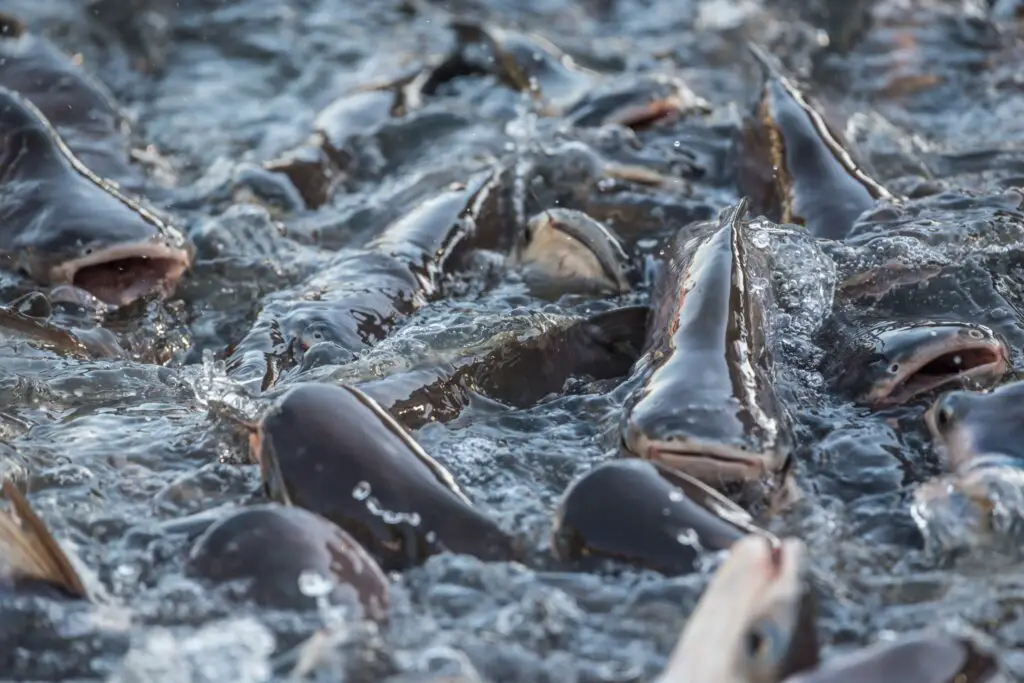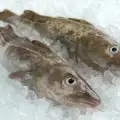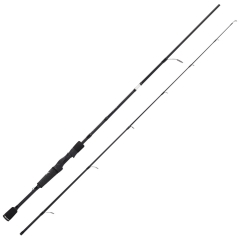Catfish are opportunistic eaters and will consume whatever food source is available to them. Smaller catfish have been known to feed on their own young or smaller baby fish of the same species. Larger catfish also may consume other adult catfish if they are not getting enough food from their natural diet or if conditions become crowded in the tank or the water area, they live in. Additionally, some larger predatory species such as the Red Tail Catfish may even attack and eat other types of large fish such as Koi carp or goldfish. It is important to note that these instances usually occur when food is limited or when competition for resources increases in an area with too many fish.
Are Catfish Cannibals?
Catfish can be cannibals. However, the fish will still go out of its way to search for its species and eat it. Catfish are omnivorous and opportunistic eaters, so they will eat whatever they can find, and sometimes that can be other catfish. Most of the time, this happens when bigger catfish attack and eat smaller catfish. Cannibalism is widespread in catfish fingerlings that are one or two inches in length and in juvenile catfishes that are not much larger. This is due to many reasons, such as competition. In the end, the larger, stronger catfish ends up eating the smaller one. A larger catfish will not eat another giant catfish. Most of the time, this is the result of a fight.

Why are Catfish cannibals?
There are many reasons why a catfish might attack its own. However, this can happen for no apparent reason at times. It is challenging to know exactly why one catfish attacked another.
It is hungry
A common reason is simply that the catfish is hungry. Remember, catfish are omnivorous, so they eat whatever they find, even dead animals that are in the water. When the catfish cannot find anything else to eat around it, the fish will attack the nearest catfish. This is especially likely if smaller and younger catfish surround the catfish. This is because it is easier to attack and overpower a smaller catfish than a bigger catfish or the same size as the fish attack.
Due to a fight
Many people forget that catfish are actually predatory fish, and they are also territorial. When another catfish threatens the territory of the catfish, it will defend its home. When this happens, the two catfish will fight and sometimes eat the other catfish that lost. This increased territorial behavior is more prevalent in the warmer months. This is due to many reasons, and one of them is that during the summer, catfish have a faster metabolism, so they are more active. This also means they are more likely to get into fights.
It is stressed
Catfish can get stressed for many reasons, including if the water temperature is not favorable, if they are sick, or simply because of the season. When the fish is stressed, it is more aggressive. As a result, the catfish will attack its own, especially if the stress is due to a lack of food. Sadly, there is no way to know why the catfish attacked another and if it was due to stress. However, if you are keeping catfish in a pond, you should find out why stress in catfish can often lead to premature death.
There is not enough oxygen
Oxygen is very important for fish, just like humans. Catfish get their food from aquatic plants, which mostly photosynthesize like normal plants. If the plants and algae are suddenly dying, the concentration of oxygen in the water will suddenly decrease. Thus, this again means that the fish will be more aggressive and frantic. This can cause fighting among catfish, and this can lead to cannibalism.
Lack of separation
If you keep catfish in a pond or lake and don’t know why the smaller catfish keep disappearing, it’s because you have yet to separate them. Depending on the size and age of the catfish, the younger ones should be kept separately from the adult catfish. If this is not done, the bigger catfish will get its food through the younger catfish by eating it. You need to have a different pond for catfish babies and older catfish. If you cannot do that, provide a lot of hiding spaces for the young catfish so it can hide along with a lot of food so that the older catfish does not get hungry and attack its own.
Do catfish eat their own fry?
Just because catfish can eat other fish does not mean that the catfish is cannibalistic towards its own fry. In fact, the parent catfishes are very caring towards their own fry and take proper care of them. When the eggs hatch and the fry come out, they are protected by the parent fish for a while. Usually, it is the male catfish that protects the fry from predators, but this can vary from species to species. The catfish still needs to eat the fry of other catfish species, though. Flathead catfish are known to be the most predatory, and they are more likely to attack the fry of another catfish, mostly blue catfish. Regardless of this, catfish are not bad parents, at least.
Conclusion
Now you know that catfish do eat other catfish of the same species or different species. This is due to many reasons like lack of food, stress, lack of oxygen, and stress. Regardless of the reason, a catfish will attack and eat another catfish, especially if it is bigger than the other catfish.
But catfish will not eat their own fry. In fact, they will protect their own fry for a few weeks after hatching from other predators that might try to eat them. Hopefully, you know everything about the cannibalistic tendency of catfish and the reasons behind it.











